Three plays with message so contemporary
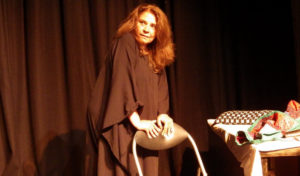
Uzma Gillani plays the role of ageing Jehan Ara
By Neena Badhwar
Nautanki Theatre’s ambitious initiative that started last year celebrated its 2nd South Asian Theatre Festival on 9th and 10th of November at Riverside’s Raffertys Theatre in Parramatta.
”˜A Celebration in Language’ ”“ the festival staged three plays from the Indian subcontinent. They were: a Gujarati play ”“ Bapu Down Under, a Sinhalese play ”“ Thara and an Urdu play ”“ Jehan Ara Ke Teen Roop.
While the Gujarati play concentrated on violence in today’s world, and the Sinhalese play also centred on Buddhist philosophy of peace, the Urdu play based on Mughal princess depicted Jehan Ara and her introspection in her old age about her life as a young woman who ruled India at the behest of her father Jehangir, famously known as Shah Jehan who retired lovelorn after the death of his favourite begum Mumtaz Mahal.
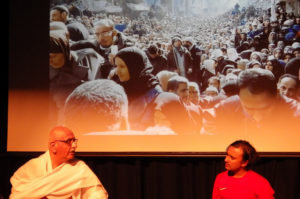
Dinsha Palkhiwala as Bapu
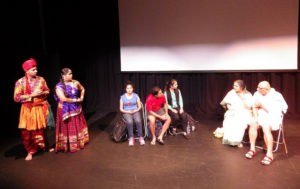
Passengers on train with Bapu and Ba
Bapu Down Under, directed by Vipul Vyas, opened up to a scene as Hemal Joshi and Saral Somaiya dressed as a Gujarati couple are to board a train to Melbourne for a peace conference. Surprisingly appear Bapu and Kasturba as fellow passengers who walk to the stage supposedly in the train compartment of a train. With them also are three youngsters on a mission different to what Bapu and Ba stood for, their life assayed by the sacrifices they made to free India from the shackles of British Raj through non violence. Their impressive entry took everyone to an era of yore yet a much needed presence in today’s world ridden with violence. Dinsha Palkhiwala as Bapu and Aparna Tijoriwala as Ba were not only brilliant in appearance, they immediately engaged the audience, with dialogues that make one think how violence only begets violence. Not only the young passengers and the Gujarati couple are transformed at the end, people in the audience are also. The world needs a Bapu again. The play which was a full length two-hour play was cut short as Aparna said later that around 13 drafts were carried out to iron and polish it to a short play that maintained the essence of Bapu’s message. Simple stage setting, the sounds, the pictures at the back of the train, the station, the steam created a seamless stage adaptation of a play and its message in a short span of a little over twenty minutes. It will make the audience think more than thirteen times, in fact many a times, a seed that has been implanted by the fine acting of the players.
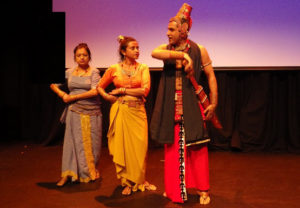
In impressive costumes, Sinhalese play ‘Thara’ gave a message of peace
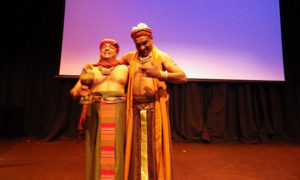
Scheming ministers plotting behind king’s back
”˜Thara’ is play, again cut to short length from a long script, written, directed and acted by Champa Buddhipala about a Sri Lankan king who wants his daughter to be a party to his victorious forays in conquering kingdoms and usurping them by force. Of course the daughter refuses to be a part in this wanton killing by the father as she believes in peace and only peace. One did not need prompting or translation as the actors played their part beautifully and used a lot of expression. The costumes worn by them impressed the viewers, simple, traditional yet rich and elegant, to which Champa said later that the play and the costumes belong to a traditional form of drama that is emerging there and to which he is a student of. The dialogues were interspersed with verses sung by the actors and performed by them effortlessly.
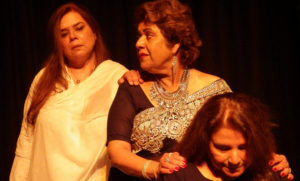
Reema Gillani, Kumud Merani and Uzma Gillani in Jehan Ara Ke Teen Roop
The third play ”˜Jehan Ara Ke Teen Roop’ opened to a dark and dreary night as the aged Jehan Ara was played by Uzma Gillani. Uzma is a great actress of Pakistan that Sydney has been able to witness now that Uzma lives here. Old age is a time for introspection, nostalgia about good times and bad, and any regrets one may carry. This play and Gillani’s acting was superb of a character, though historical, but the thought quite applicable to our contemporary world where we came to Australia in our young years enjoyed economic leisures of our lives and now going down hill we think of life’s ups and downs as we age. As an ageing Jehan Ara Uzma was brilliant yet the young Jehan Ara portrayed well by one and only Kumud Merani was in my view should have been played by a young actor. Jehan Ara carries in us an image of very beautiful Mughal princess and Kumud looked old, no criticism to her able acting which she carried with aplomb. And young Jehan Ara played by Reema Gillani in the third role of great Jehan Ara regrets her decision of dumping her baby, who having fallen pregnant to her amour, has to hide it from the eyes of the world. Her tears she said, afterwards, were real having cried a few times while practicing. Those regrets we carry in our bosom of various sorts which come out spilling in the dark nights of old age is how this play makes you think. It was conducted excellently and touched us all in its simplicity yet profound message it forces one to delve into. Great performance by all of a tight script with good dialogues.
It was an evening worth witnessing of theatre groups from different subcontinent background coming together on Nautanki platform, to which the director, Neel Bannejee, said humbly, after the show, “Its all their effort. I am only in the background.”
Well, Neel, well done, even if.
Short URL: https://indiandownunder.com.au/?p=10138
